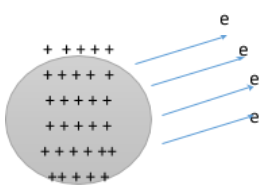Question
Question: A positively charged body has deficiency of: (A) electrons (B) protons (C) neutrons (D) hol...
A positively charged body has deficiency of:
(A) electrons
(B) protons
(C) neutrons
(D) holes
Solution
Charge is a property of matter by the virtue of which all types of electric and magnetic phenomenon are produced. Naturally everybody is made of atoms in which both positive and negative charge are there in the form of electrons and protons are in equal quantity that’s why by nature everybody is electrically neutral. Body can be charged by exchange of electrons only.
Complete answer:
All matter is made up of tiny indivisible units called atoms. Naturally all atoms are electrically neutral; it means having equal amounts of positive and negative charge. In common practice a body can be charged by the exchange of electrons as protons are confined within the nucleus of an atom and in general cases it requires a huge amount of energy to extract or add a single proton from the nucleus of an atom which is classically not possible.
In general whenever we talk about a positively charged body then it means the body is electron deficient and if we talk about a negatively charged body then we consider there are excess electrons on the body.

Hence option (A) is the correct answer.
Note: When a body is charged in the state of rest or motion it exhibits several different phenomena and effects, applications of which are used in many practical cases in our surrounding. All the phenomena concerned with charges including electricity and magnetism are broadly classified into two parts- Electrostatics and Electrodynamics. Electrostatics deals with the study, effects and the applications of charges at rest.
